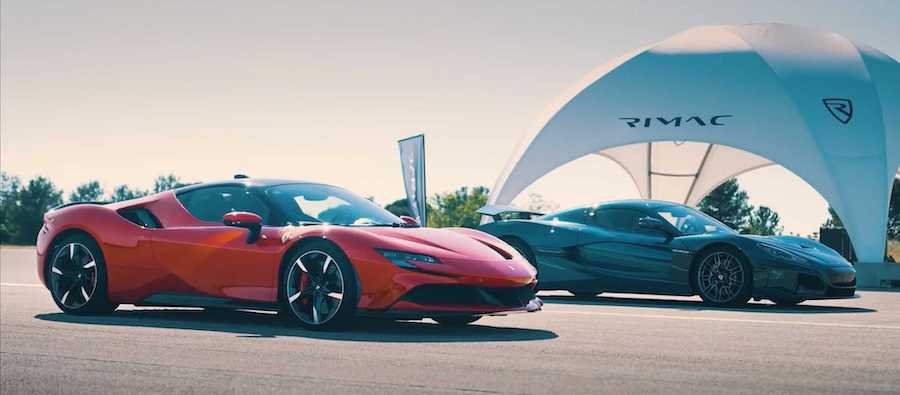Rimac Nevera Obliterates Ferrari SF90 Stradale In Drag Race

The Rimac Nevera debuted just a few hours ago, and it's already cementing itself as the new performance hypercar to beat. Its all-electric powertrain delivers an astonishing 1,914 horsepower (1,408 kilowatts) to all four wheels, and a new Carwow video shows it downright obliterating the potent Ferrari SF90 Stradale in a series of drag races. It's barely a competition as the Ferrari's hybrid setup is no match for Rimac's electric powertrain.
The Ferrari is no slouch by any stretch of the imagination, with its twin-turbocharged 4.0-liter V8 and electric motors putting out 1,000 hp (745 kW) and 800 Newton-meters (590 pound-feet) of torque through its all-wheel-drive system. The Rimac delivers 2,360 Nm (1,731 lb-ft) of torque). The Croatian hypercar can reach 60 miles per hour (96 kilometers per hour) in a claimed 1.85 seconds. The Rimac is heavier than the Ferrari by 380 kilograms (661 pounds), though this doesn't help the Italian supercar.
That performance difference between the two is instantly noticeable in the drag races, with the Rimac winning every single one. The Rimac even wins the races where the Ferrari cheats to get a lead off the starting line. Carwow host Matt Watson achieved a stunning 8.62-second quarter-mile time at 171.79 mph (276.47 kph). The Ferrari's best time came during the second drag race, completing the quarter-mile in 9.6 seconds at 148.85 mph (239.55 kph).
The Rimac Nevera is the final version of the C_Two concept the company introduced over three years ago. The company has refined the design, which has resulted in a 34 percent boost in aerodynamic efficiency. The tweaked design allows for better cooling of the powertrain and brakes, up to 30 percent better at low speeds. It takes the hyper EV 9.3 seconds to reach 186 mph (300 kph) when it's on its way to a top speed of 258 mph (412 kph). The company will make just 150 units, each costing €2 million.
Related News
